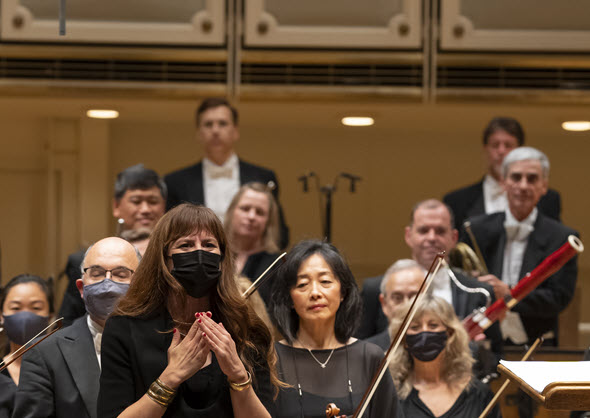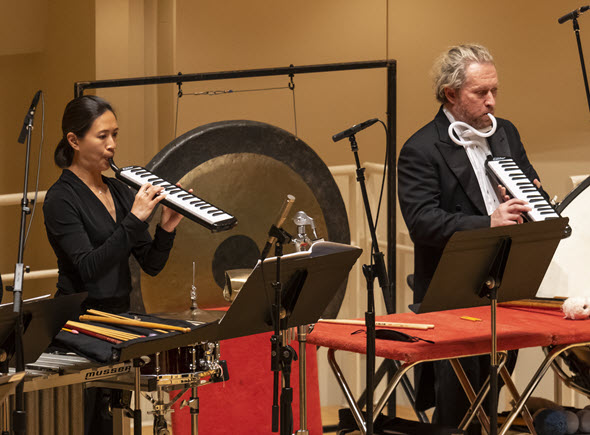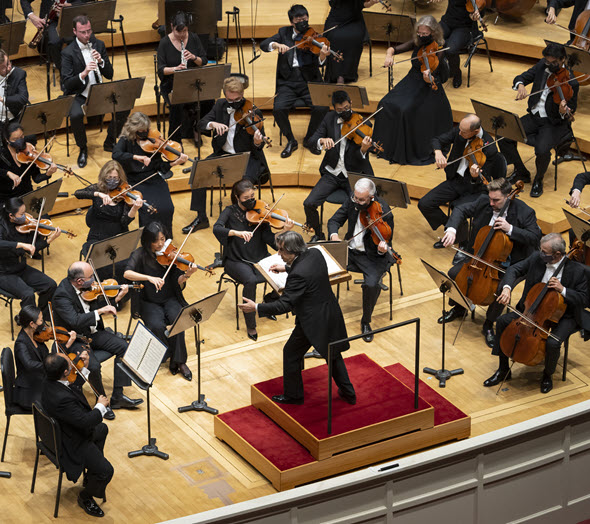Lyric spirits meet at last: Riccardo Muti leads CSO in poetic turn through music by Mazzoli

Bizarre twist: Composer Missy Mazzoli, who takes a bow with the CSO, was unable to meet with music director Riccardo Muti in person until after her term as resident composer ended. (Photos by Todd Rosenberg)
Review: Chicago Symphony Orchestra conducted by Riccardo Muti at Orchestra Hall. Repeats Oct. 9 at 8 p.m.
By Nancy Malitz
Of all that has been lost to Chicagoland in these many months of forced seclusion, the musical experience I most missed was the ability to hear live, in real time, and in the company of thousands, the music of the Chicago Symphony Orchestra under its music director Riccardo Muti. When the 80-year-old Italian master of the symphonic tradition conducts music he has long lived with, shaping ideas with the exceptional instrumentalists who know him well, the experience achieves a rare intensity that stays long and is further shaped in memory.
But how can I complain after learning that Missy Mazzoli, the 40-year-old American composer with a rare lyric gift who was appointed the Chicago Symphony Orchestra’s composer-in-residence starting with the 2018-19 season, hadn’t even met Muti in person until recently?
Among the composers-in-residence appointed by the CSO during Muti’s tenure, Mazzoli is the one whose interests are most in sync with his. She has several successful operas and lyric works under her belt already, and another, based on Abraham Lincoln’s late-life traumas over the ghastly toll of the American Civil War and the death of Lincoln’s young son, is promised for New York City’s Metropolitan Opera in 2025.
Muti, who is conducting a work by Mazzoli, “These Worlds in Us,” for the first time, repeats this intense, troubling nine minutes of dreamlike music on Oct. 9 at Orchestra Hall. Programmed on a CSO concert with Tchaikovsky’s mighty “Pathetique” Symphony and Liadov’s delicate seven-minute perfection from 1909 called “The Enchanted Lake” – both expertly done and worthy of prolonged discussion in another context – it is nevertheless the dauntless living composer’s voice that haunted this listener’s morning after.
Thus there is another important Chicago date, just announced for later this season, worth immediately affixing to the calendar. It is Mazzoli’s big CSO commission, “Orpheus Undone,” which will be premiered by Muti and the CSO at Orchestra Hall on the weekend of March 31, 2022.
As the name of her forthcoming work suggests, and Mazzoli confirms, “Orpheus Undone” will draw upon the famous myth of the bridegroom Orpheus, who descends to the underworld in a failed attempt to rescue his mortally snakebit bride. Mazzoli’s willingness to make her mark with a story that has already inspired masterpieces by Monteverdi, Gluck, Haydn, Liszt, Stravinsky, Cocteau, Camus, Rilke and the playwright Tennessee Williams, among others, suggests that this composer is well past self-conscious dabbling.
The remarkable main theme of “These Worlds in Us” (2006) is uttered by the strings in an eerie whisper that is instantly startling – a pair of descending tri-tones in sequence that becomes, through dint of quiet repetition, mysteriously hypnotic. It is music of longing, evoking the pastoral cowbell, the raspy rumblings of mid-century record needles, in all a rapturous memory state that then, abruptly, can swing terrifyingly dark. There are several such swings, as in a dream. The composer relates that the darker music was inspired by her father’s experience as a soldier in Vietnam, about which she knew nothing at all until after she had grown, and he shared some memories because she asked.
The title “These Worlds In Us” is drawn from a poem by James Tate, who similarly muses on his own father’s death in World War II, and the intense life experiences that each of them had, unknowable to the other. In Muti’s account, Mazzoli’s elegant message of longing, memory, and envisioned terror do haunt the whole hypnotically. I have heard this work performed by four different conductors and orchestras, but this is the first time that the ghastly color of war itself was given such force.
Muti often speaks of Italy’s brutal war experience, the bombed city centers of his boyhood, and the yearning for the restoration of art and beauty that became such a cultural imperative for his parents’ generation. Perhaps that personal history explains, in part, the forcefulness of “These Worlds In Us” as Muti interprets it. Perhaps Covid itself, and the havoc it has wreaked, also has played its part in the minds of the CSO musicians and the listening audience. Whatever the case, “These Worlds” as paired with Tchaikovsky’s equally enigmatic “Pathetique,” in a brilliant performance, offered a remarkable catharsis.
The CSO has announced that it will detail the rest of the current 2021-22 season on Oct. 12, in the expectation that the effects of Covid-19 remain within the current prescribed limits.
Meanwhile, to sample the range of expression in Mazzoli’s music, one can hear a 60-second bit of her homage to the steelpan drumming tradition of the West Indies, below, as well as a small slice of her concerto for double bass and chamber orchestra that highlights the dexterity and coloristic range of the orchestra’s largest string instrument. Through these so-called CSO Sessions for chamber forces, which were livestreamed at full length under last year’s severely hampered conditions for gathering, the musicians of the CSO and Mazzoli were at least able to get to know each other, and to derive some mutual benefit from her star-crossed residency.



